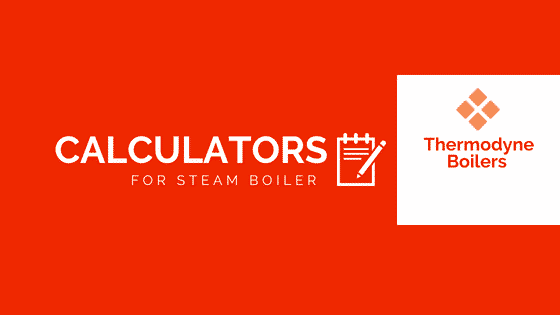Steam Boiler Calculator Based on Formulas
Our Steam Boiler Calculators making boiler system related calculations easy, the thermodyne team created several online calculators and tools.
Use following Essential industrial Steam boiler calculator to solve boiler industry related calculations for free.Check outour Standard Steam Boiler Calculators based on Industrial formulas for Steam and Boiler calculations
Steam Boiler Calculators

- Boiler Efficiency Calculator
- Steam Outlet Size Calculation
- Air quantity calculation for Combustion
- Flue gases quantity calculation for Combustion
- Boiler Blowdown Calculator
- FD Fan Motor Power Calculator
- ID Fan Motor Power Calculator
- Chimney Draft Calculator
Steam Boiler Calculators FAQ
Flue gas is the gas that is produced when fuel is burned. It contains a mixture of combustion products, including carbon dioxide, water vapor, nitrogen, and oxygen.
Flue gas calculation is used to determine the efficiency of a boiler or furnace. It can also be used to identify problems with the combustion process, such as incomplete combustion or excess emissions.
There are several different methods of flue gas calculation. The most common method is to use a flue gas analyzer. A flue gas analyzer is a device that measures the concentration of various gases in flue gas. The results of the analysis can then be used to calculate the efficiency of the boiler or furnace.
The following factors can affect flue gas calculation:
The type of fuel being burned
The amount of fuel being burned
The combustion air-to-fuel ratio
The temperature of the flue gas
The pressure of the flue gas
Improved efficiency of boilers and furnaces
Reduced emissions
Increased safety
Improved compliance with environmental regulations
Using a calibrated flue gas analyzer
Following the manufacturer’s instructions for the flue gas analyzer
Taking samples from the flue gas at the correct location
Cleaning the flue gas analyzer regularly
Using an uncalibrated flue gas analyzer
Not following the manufacturer’s instructions for the flue gas analyzer
Taking samples from the flue gas at the wrong location
Not cleaning the flue gas analyzer regularly
Check the calibration of the flue gas analyzer
Follow the manufacturer’s instructions for the flue gas analyzer
Take samples from the flue gas at the correct location
Clean the flue gas analyzer regularly
The EPA’s website has a number of resources on flue gas calculation, including a calculator and a guide to interpreting the results of flue gas analysis.
The American Boiler Manufacturers Association also has a number of resources on flue gas calculation.
There are a number of manufacturers of flue gas analyzers that offer training and support on their products.
The development of more accurate and portable flue gas analyzers
The use of flue gas analysis to monitor the performance of boilers and furnaces in real time
The use of flue gas analysis to diagnose problems with boilers and furnaces
The use of flue gas analysis to comply with environmental regulations
A boiler efficiency calculator is a tool that can be used to estimate the efficiency of a boiler. This information can be used to determine how much fuel is being wasted and to identify opportunities for improvement.b
Boiler efficiency calculators typically use a variety of factors to estimate efficiency, including the type of boiler, the fuel being used, and the age of the boiler. Some calculators may also ask for information about the climate and the size of the home or building being heated.
The accuracy of boiler efficiency calculators varies depending on the calculator and the factors that are used to estimate efficiency. In general, however, these calculators are a good way to get a general idea of the efficiency of a boiler.
There are several benefits to using a boiler efficiency calculator. First, it can help you to identify opportunities for improvement. Second, it can help you to save money on your energy bills. Third, it can help you to reduce your carbon footprint.
There are a number of boiler efficiency calculators available online. A quick search will turn up several options.
Here are some additional tips for using a boiler efficiency calculator:
Be sure to enter accurate information about your boiler and your home or building.
Use the calculator to get a general idea of the efficiency of your boiler.
If you are concerned about the efficiency of your boiler, contact a qualified technician for a more accurate assessment.
